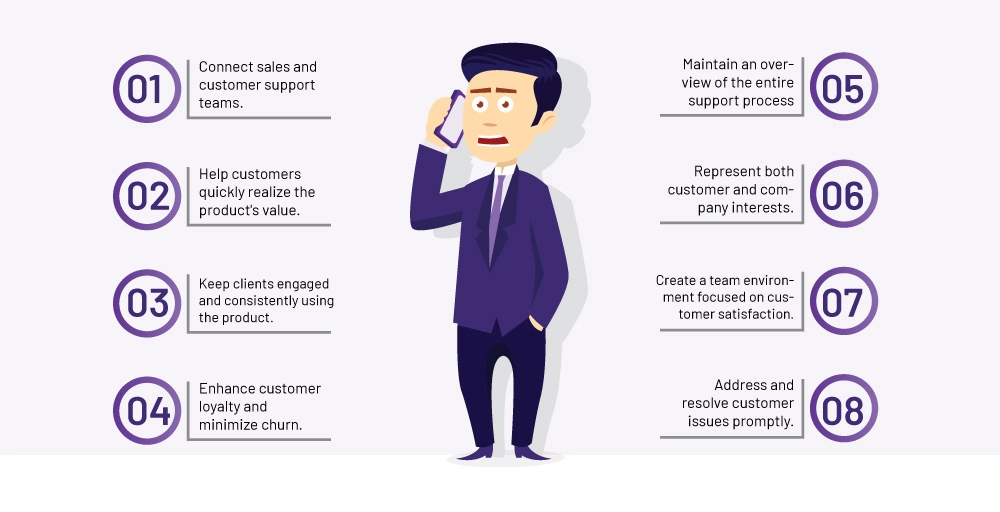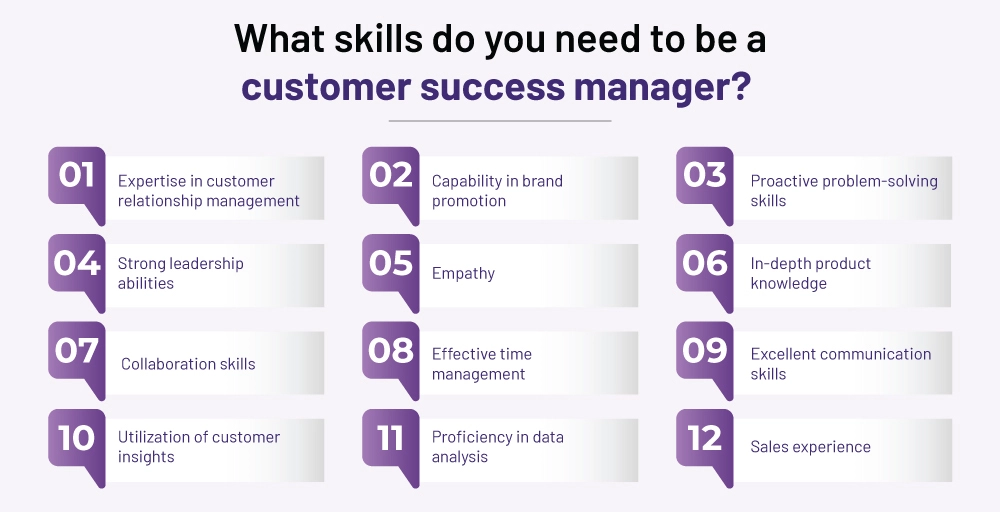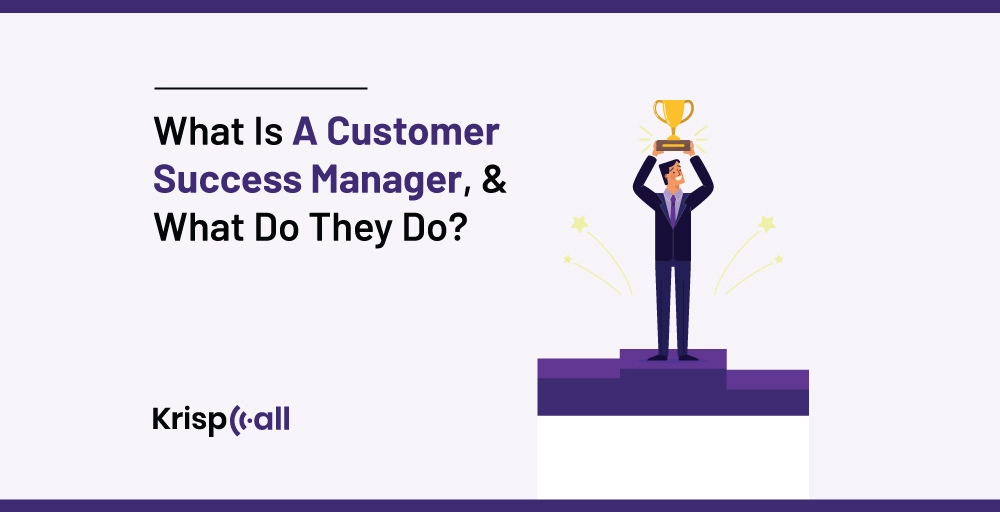Ever wondered🤨 why some businesses effortlessly retain loyal customers while others struggle to keep them engaged?
The secret lies in the role of a customer success manager, a dedicated professional who ensures client satisfaction by prioritizing their needs with a customer-first strategy. They’re the ones who ensure clients stick around by proactively solving problems, offering assistance, and ensuring customers feel valued, bridging the gap when only a few employees directly interact with customers.
Now, let’s delve into the world of customer success managers, exploring the skills they need and how they contribute to long-term business success.
Let’s get started🚀.
😎Key Highlights
- A Customer Success Manager ensures customer satisfaction and success by building relationships, solving problems, and actively assisting in goal achievement.
- Customer Success Managers ensure positive customer relationships by connecting teams, helping customers see value, maintaining engagement, advocating for needs, and promptly resolving issues.
- Customer Success Managers need a range of skills like problem-solving, leadership, empathy, and sales experience to ensure customer satisfaction and success.
- The average annual salary for Customer Success Managers in the United States ranges from $46,029 to $261,184.
What is a customer success manager?
A Customer Success Manager is a professional who ensures customer satisfaction and success with a company’s products or services by building relationships, solving problems, and assisting in goal achievement🎯.

Unlike regular customer support agents who just fix things when they go wrong, Customer Success Managers go a step further. They connect with customers on a personal level, offering advice and solutions when needed to ensure customers get the most out of what they’ve bought. This not only helps customers succeed but also keeps them loyal to the company.
Additionally, CSMs act as a bridge between sales and customer service. They work to make the product more valuable, keep customers from leaving, and oversee support operations from a big-picture view.
While customer service representatives handle issues as they pop up, CSMs take a proactive approach, aiming to stop problems before they happen. They’re always looking for new ways to help customers thrive with the company’s products.
What does a customer success manager do?
Customer Success Managers (CSMs) are involved in various tasks throughout the entire customer journey, starting from before a sale and continuing through post-purchase support. Their goal is to establish and maintain a positive and mutually beneficial relationship with customers.
In the section below, we’ll explore some of the specific responsibilities CSMs handle to achieve this objective.

1. Connect sales and customer support teams.
As customers start their journey with the company, the customer success team steps up to help. They guide customers through the onboarding process and act as mentors along the way.
As customers progress, the Customer Success Manager (CSM) periodically checks✅ in to find opportunities for additional sales, involving the sales team when needed.
2. Help customers quickly realize the product’s value.
There are two important moments in the customer journey: when they first sign up for a product and when they experience their first success with it. This success could mean achieving financial goals or simply saving time.
However, if there’s too much time⏳ between signing up and experiencing success, customers might become frustrated and lose interest, which is known as “customer churn.” That’s where most customer success teams step in. They assist customers in using the product effectively to realize its benefits quickly.
A Customer Success Manager’s primary role is to ensure customers get started swiftly and remain satisfied as they keep using the product.
3. Keep clients engaged and consistently using the product.
Customer Success Managers (CSMs) ensure clients use products consistently and effectively by regularly checking in and monitoring usage patterns. They track how often users log in and interact with the product, and if they notice a decline in activity, they reach out to understand why.
CSMs address any issues or feature requests, providing additional support and passing feedback✍️ to the development team. This proactive approach keeps customers happy, reduces frustration, and encourages them to stay loyal and engaged with the product.
4. Enhance customer loyalty and minimize churn.
A customer success manager plays a crucial role in ensuring customers have a positive experience with a company’s product or service, particularly during the onboarding process. They guide new customers through this initial phase, ensuring they understand how to use the product effectively and addressing any concerns they may have.
However, the role of a customer success manager extends beyond onboarding, as they continue to support🤝 customers throughout their entire journey with the product.
This ongoing support helps build trust and satisfaction, ultimately contributing to customer retention by preventing customers from leaving.
5. Maintain an overview of the entire support process.
Customer success managers have a broad view of the entire customer journey, allowing them to see patterns and trends that affect many clients. While service representatives deal with individual problems, customer success managers can predict future issues and take action to prevent them.
This proactive approach is valuable for both clients and the business, as it helps to address potential problems before they escalate.
By having this high-level perspective, CSMs can anticipate challenges and take steps to mitigate them, ultimately benefiting both clients and the overall business.
6. Represent both customer and company interests.
Customer success managers also monitor future product improvements and changes. They represent their customers by linking🔗 their needs to the company’s broader customer experience strategy.
For example, if a customer success manager sees many clients requesting a similar product upgrade, they can explain to product managers why it’s important. This helps the business make the right improvements to keep customers satisfied.
Similarly, customer success manager can generate enthusiasm among customers about upcoming product releases and improvements, supporting the company’s goals.
7. Create a team environment focused on customer satisfaction.
Ensuring that customers are a top priority isn’t just the job of one team; it involves everyone in the company. Customer success managers help by sharing customer feedback and highlighting areas where customers are having problems.
They work with different teams like customer service, sales, support, and product development to make sure everyone understands and responds to customer needs.
In simple terms, they make sure that the whole company listens to and takes care of its customers.
8. Address and resolve customer issues promptly.
A customer success manager is responsible for identifying, communicating📢, and resolving moderately complex customer issues. They provide solutions to address customer pain points and identify opportunities for business expansion.
For example, a customer success manager may specialize in serving clients from a particular industry and keep track of industry trends. With this knowledge, they can give personalized advice on how customers can use the product well and succeed.
What skills do you need to be a customer success manager?
Today’s customers expect more than good products; they want personalized service from people who genuinely care about their needs.
Here are the 12 essential skills necessary to be a customer success manager.

1. Expertise in customer relationship management
Sales and service reps focus on keeping customers happy in the short term, while customer success managers focus on delivering long-term value. For CSMs, their commitment begins when a customer signs up.
Customer success managers take charge of building relationships. They regularly check in with customers to keep communication open and promptly address concerns.
2. Capability in brand promotion
Customer success managers (CSMs) build excitement around new or evolving products by keeping clients informed about their progress📈. They organize demonstrations and training sessions when new products are launched. If customers choose to include these new products in their plans, success managers assist in their implementation.
CSMs naturally identify opportunities to upsell because they have taken the time to understand their clients and gain their trust. This personal connection is crucial in identifying and presenting expansion opportunities effectively.
Moreover, they offer technical support and training to ensure customer satisfaction. This support is particularly vital during the onboarding process, where CSMs work closely with customers to ensure a smooth transition to using the product.
3. Proactive problem-solving skills
Customer success managers regularly check in with their clients and ask direct questions to understand how happy they are. They also look at how often clients use the company’s software to gauge their satisfaction.
If a CSM notices any warning signs⚠️, they can take action right away to address the issue before it escalates. This might involve something as simple as giving the client a call to check in or offering to host a lunch-and-learn session for their staff to learn more about the product.
Because CSMs already have a strong and open line of communication with their clients, these actions feel natural and are appreciated.
4. Strong leadership abilities
Customer success managers (CSMs) often take the lead in guiding the team and mentoring junior members to boost customer success enablement. They organize training sessions and other activities to enhance customer satisfaction.
Since they interact directly with clients, CSMs need to be quick problem-solvers with excellent customer service skills. They should take initiative and be ready to handle new challenges.
5. Empathy
Empathy is crucial for customer-facing roles, especially for customer success managers who often handle important issues directly with customers. They must understand and relate to their customers’ perspectives while managing expectations.
Additionally, they may need to provide empathy training to their teams to enhance their ability to connect with customers on a deeper level and improve customer empathy.
6. In-depth product knowledge
Customers expect success managers to have a thorough understanding of the business’s products, services, and policies. Success managers need to resolve issues and provide guidance on how to best utilize a product or service.
This ensures customers have a smooth and beneficial experience, making them more likely to stay loyal to the company.
7. Collaboration skills
Customer success managers should enjoy teamwork and be able to collaborate with various internal groups to improve customers’ experiences. One of their main roles is communicating customer pain points to different teams within the organization.
By doing this, they help ensure that everyone is aware of customers’ issues and can work together to find effective solutions. This collaboration addresses immediate concerns and contributes to the overall enhancement of the product or service, leading to increased customer satisfaction and loyalty.
8. Effective time management
Customer success managers often have to manage multiple projects and customers simultaneously. To do this effectively, they need strong project management and organizational skills. They must also be good at setting priorities to ensure everything gets done on time.
This involves handling various tasks, such as scheduling meetings📅, tracking progress, and addressing customer needs promptly. Being organized helps them stay on top of their workload and ensures they can provide the best support to their clients.
9. Excellent communication skills
Successful customer success management relies on excellent communication, social, and writing abilities. Having prior consulting experience is beneficial, particularly in roles involving direct interaction with customers.
Customer success managers frequently lead both virtual and in-person meetings to promote product usage and maintain customer loyalty, underscoring the importance of effective presentation skills.
10. Utilization of customer insights
Customer success managers need to be really good at understanding what customers want and noticing bigger patterns in their behavior.
This helps them give each customer a personalized experience and make improvements that benefit everyone’s overall experience with the company’s products or services.
11. Proficiency in data analysis
Your customer success strategy should be driven by company data. As a CSM, you must analyze important customer service metrics, use this data to prevent issues before they arise, justify your approach, and effectively communicate your insights to the customer success team and other relevant stakeholders.
12. Sales experience
Knowing the right time to suggest extra products or upgrades to customers is vital for keeping them happy and coming back. Sales experience can really help with this, as it lets you offer upgrades without being too forceful and helps customers choose what they need.
When customers are happy with your product and find success🏆 with it, they’re more likely to stick around.
What is a customer success manager’s salary?
Here is the average salary💸 for a customer success manager in the United States according to three sources: Glassdoor, Indeed, and Salary.com.

- According to Glassdoor, the estimated total pay for a Customer Success Manager in the United States area is $143,363 annually, ranging from $108,000 to $195,000.
- According to Salary.com, the average salary for a Head of Customer Success in the United States is $234,730, typically between $198,592 and $261,184.
- According to Indeed, the average base salary per year is $78,433, with a low of $46,029 and a high of $133,646.
Let’s review📝 some roles with similar responsibilities and descriptions as the customer success manager.
Customer Success Specialist Salary
The average salary for a Customer Success Specialist in the United States ranges from $40,462 to $267,102, with an average base salary of $45,082.
Customer Onboarding Manager Salary
The average salary for a Customer Onboarding Manager in the United States ranges from $76,606 to $94,500, with an average annual salary of $76,606.
Senior Customer Success Manager Salary
The average salary for a Senior Customer Success Manager in the United States ranges from $106,470 to $148,183, with an average base salary of $125,208.
Client Onboarder Manager Salary
The average salary for a Client Onboarding Manager in the United States is $76,606 per year, with an average hourly wage of $36.83. The salary range varies from $73,500 to $94,500.
Customer Experience Manager Salary
The average salary for a Customer Experience Manager in the United States is $113,976 per year, with a range typically falling between $95,083 and $136,221.
Wrapping Up
Customer success managers are vital for keeping customers happy🤗 and loyal to a company’s products or services. They focus on understanding customer needs, building relationships, and working with different teams to support business growth.
With skills like empathy, communication, problem-solving✔️, and leadership, they smoothly guide customers through their experience.
The best customer success managers genuinely care about their customers. They understand their goals and needs, which helps them suggest new ways for customers to use products and solve issues before they become problems.
And in this field, they can expect good pay💰 and lots of job options. Overall, they play a key role in ensuring customer satisfaction and driving the company’s success.
FAQ
What is the role of the customer success manager?
Customer Success Managers ensure customer satisfaction and success by building relationships, solving problems, and assisting in goal achievement with a company’s products or services.
Is customer success manager a high paying job?
Customer Success Manager roles can offer competitive salaries, with earnings varying based on factors such as experience, location, and industry.
What does a customer success manager do daily?
A Customer Success Manager’s daily tasks typically include building customer relationships, addressing inquiries and issues, providing product guidance, analyzing customer data, collaborating with internal teams, and ensuring customer satisfaction and success.
How to become a customer success manager with no experience?
To become a Customer Success Manager without prior experience, focus on gaining transferable skills like communication and problem-solving, learning about customer success initiatives, seeking entry-level roles in customer service or sales, networking, customizing your resume to highlight relevant skills, preparing for interviews, and considering certifications to demonstrate your readiness for the role.
Is customer success a stressful job?
Yes, customer success role can be stressful due to the need for effective communication and problem-solving, but strategies like time management and support can help manage stress levels.
Is it hard to become a customer success manager?
Yes, becoming a Customer Success Manager can be challenging due to the diverse skill set required, including communication, problem-solving, and relationship-building. However, it is achievable with dedication, relevant experience, and continuous learning.
What is the hourly rate for a customer success manager in the US?
The average hourly rate for a Customer Success Manager in the United States is around $40 to $54 per hour.
Are customer success managers in high demand?
Yes, customer Success Managers are in high demand, as indicated by the active job market and competitive salaries in the field.
What qualifications are typically required for a Customer Success Manager position?
While specific qualifications may vary depending on the company and industry, typical requirements for a Customer Success Manager position include a bachelor’s degree in a relevant field, such as business, marketing, or communications, along with strong interpersonal skills, problem-solving abilities, and a customer-centric mindset.
What is a Customer Success Department?
A Customer Success Department is a dedicated division within a company that focuses on ensuring customer satisfaction, retention, and success. It typically consists of teams and professionals who work collaboratively to engage with customers, address their needs, and drive value throughout their journey with the company.





